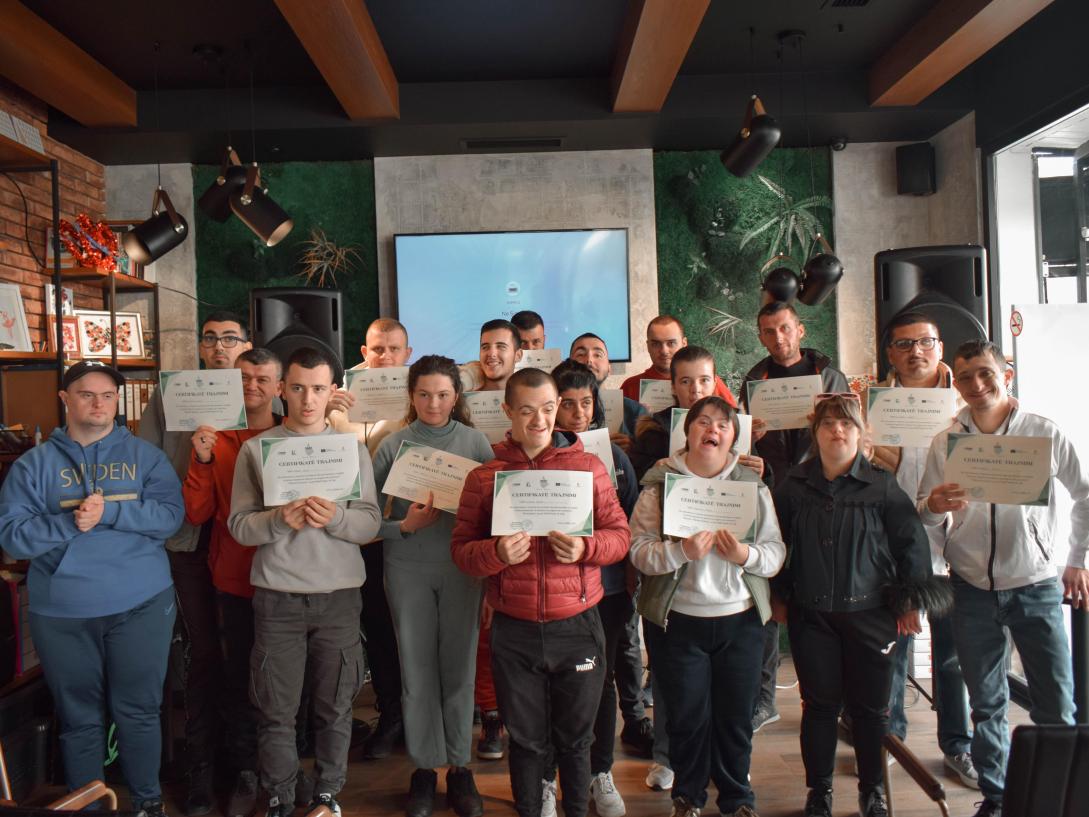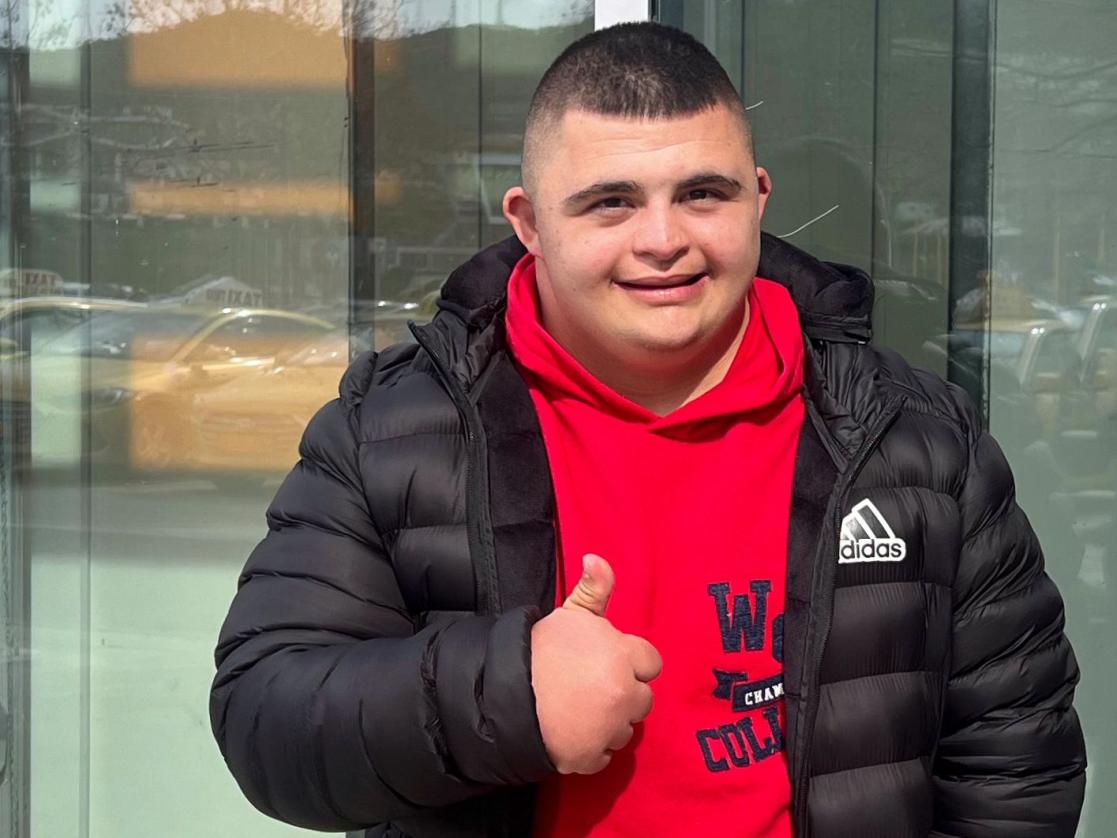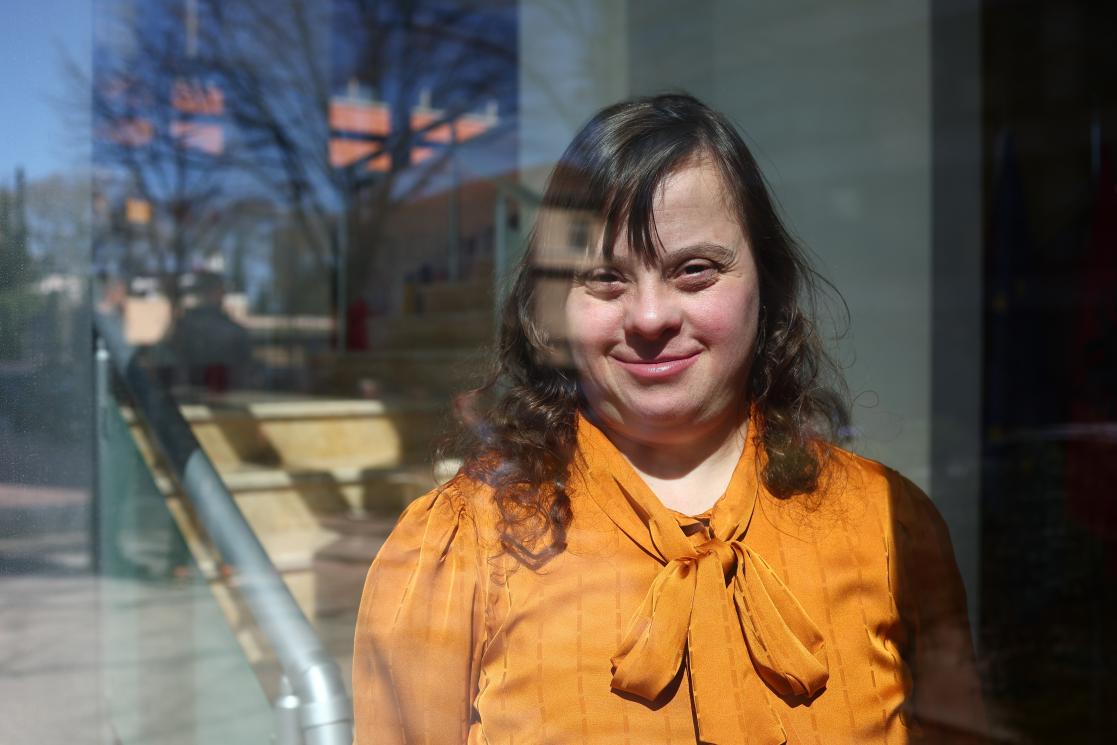From training to work, the colours of life hidden behind an extra chromosome

“My dream was to go to a medical school, I wanted to become a surgeon. I like the white coat, the stethoscope around the neck and I want to heal people”, says Adri Duqi who likes playing guitar and football in his free time, but also likes to be independent. Now in his twenties, he works in a big trade center nearby Tirana. “I like my job. I like the colleagues and the clients. I am happy with what I do as a maintenance worker, because I like to be independent”, he says with big smile and showing gratitude. It has been a long and difficult journey for him and his family.

EU in Albania
Three months after he was born, the doctors told his parents he has Down syndrome and since then, they knew he needed special care and attention. He went to the elementary school in his village, Pëllumbas, close to Tirana, then at the high school nearby and for more than 10 years he has attended Music, Speech and Occupational Therapy at Jonathan Center, an organisation which provides free services for children and adults with special needs. “I have learned playing piano and guitar there, and also painting. I liked painting pigeons”, he explains, taking a break in a coffee shop just after his working hours.
For Adri’s parents the last few months have been a time of relief. Finally, he can go to work by himself, taking the bus from Pëllumbas to the trade center. “When Adri started to work here, for two or three months I would follow the bus every day, until he would get off it. Then, I used to wait until he finished work, and watch him from a certain distance. I was concerned if he would remember the bus station, if he would feel alone, if he would need us. I had to be somewhere behind him, in any case, until I was sure he knows how to come at work and then come back home”, his father, Lutfi Duqi, recalls. For him, it’s a big achievement that his son has taken these steps after all the years in therapies, traveling every day from his village to Tirana.
Adri Duqi is one of the adults with Down syndrome employed after attending occupational therapies. This year, Jonathan Center has opened SNAP Atelier & Café, a social enterprise focused on providing training and employment opportunities for individuals with special needs at the Fresku area in Tirana. About 30 young adults with special needs over 16 years old have been trained in the café as bartenders, maintenance workers, while learning the art craft of quilling method in the atelier.
Last Friday, SNAP Atelier & Café held a ceremony handing out certificates for all the participants in the trainings. Vanesa Doçi, a 17 years old girl with autism, is one the participants who attended the quilling atelier - a technique used to produce postcards, decorative products, frames and accessories with paper. The method helps children and adults with autism in interaction and communication.

EU in Albania
“At the beginning it was difficult for her. She needed time to get used to the people but then I could understand she liked quilling. My daughter has created postcards with flowers, for me and her sister. I hope in the future I can open a little shop for her, so she can work and sell her handcrafts”, says Mirjana, Vanesa’s mother, who has left her job and takes care of her daughter. Her advice to other parents is her own example, children with special needs should attend the different therapies and do sports.
She has seen her daughter change year after year and now she knows that she doesn’t have to wait for Vanesa to ask for things she wants, she has to show her different things and see what she likes.
“We have trained young people with the Down syndrome, autism or mental health problems that do not interfere with the daily function of the individual. Nine of them are employed at SNAP already. But we still have work to do, starting by explaining our cause, what we do, what is a social enterprise and why we hire people with special needs. Not every client in the Café accepts the cup of coffee from a person with special needs so sometimes we must raise awareness”, explains Oreada Kita, founder and executive director of Jonathan Center.
Trainings are the first phase of the project, the second is employment, which Kita has been pushing forward for years collaborating with different business in Tirana trying also to promote inclusiveness in the society and the need to create possibilities for different citizens.

EU in Albania
“I like my job. I work for three or four hours a day and my coworkers don’t let me to get tired”, says Marinela Hyraj, an adult with Down syndrome, who is hired in a bank in Tirana as part of the same programme. Her father can notice that she feels good at work. “There has been an enormous support for my daughter. They respect her, showing love and care, but what is important, is that she is not despised at work. We can notice it sometimes around us”, says Abas Hyraj, accounting the challenges most of the families face.
From trainings to work is still a challenge for a lot of people with Down syndrome, but all of them show us, with their big smile, the colours of life hidden behind an extra chromosome.
BACKGROUND INFORMATION
Spreading Social Enterprise: Training, Work and Inclusion is a project funded by European Union in Albania and implemented by ENGIM – Ente Nazonale Giuseppini Del Murialdo -aiming to support the sustainable and inclusive development of the Albanian economy, promoting social entrepreneurship and the social re-use of confiscated assets. The specific objective is to strengthen new models of social entrepreneurship and the managerial skills of local CSOs that ensure the socio-economic inclusion of disadvantaged groups, focusing on the social re-use of confiscated assets.





